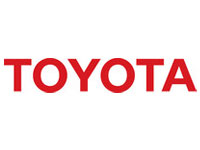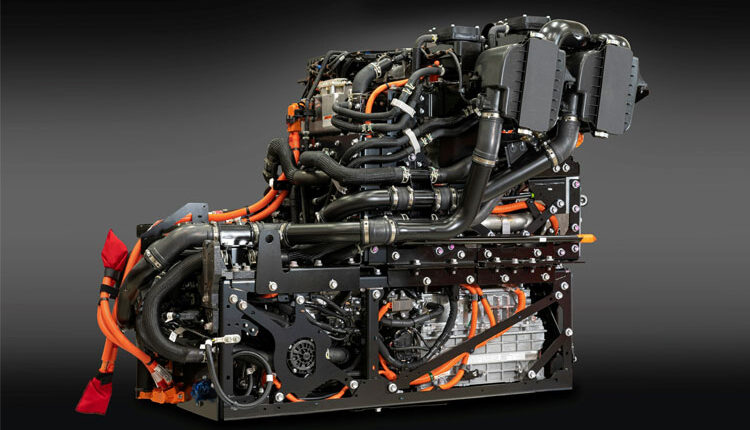... CARB Executive Order certifies Toyota's heavy-duty fuel cell electric powertrain kit as a Zero-Emission Powertrain (ZEP)
... Allows qualified heavy-duty truck manufacturers using the fuel cell electric powertrain kit to be eligible for incentives
... Toyota plans to begin assembly of new, more efficient fuel cell modules for hydrogen-powered, heavy-duty commercial trucks at its Kentucky plant later this year
Heavy-duty Class 8 commercial truck original equipment manufacturers and operators now have another tool to help them comply with increasingly strict emissions regulations in the State of California. Toyota announced today that it was recently granted a Zero Emission Powertrain (ZEP) Executive Order from the California Air Resources Board (CARB) for its new heavy-duty fuel cell electric powertrain. The hydrogen-fueled powertrain kit includes hydrogen fuel storage tanks, fuel cell stacks, batteries, electric motors and transmission, and offers a viable alternative to traditional diesel powertrains used in commercial goods transportation as companies look to transition their fleets to zero-emission vehicles.
CARB’s ZEP Executive Order certifies that a powertrain complies with CARB regulations for zero-emission powertrains determined to meet specific emissions standards required for sale in California. OEMs using Toyota’s certified powertrain may also be eligible for other available incentives, such as CARB’s Hybrid and Zero-Emission Truck and Bus Voucher Incentive Project (HVIP), the Clean Truck Fund (CTF) introduced last year by the Ports of Los Angeles and Long Beach, and certain federal incentives.
“Toyota aims to reduce or eliminate emissions for all mobility solutions, and our fuel cell electric powertrains have proven that hydrogen can play a significant role in the emissions reduction of emissions from heavy-duty transportation,” said Scott Friedman, senior program manager advanced mobility, Toyota Motor North America. “Receiving the Zero-Emission Powertrain Executive Order from CARB is a key achievement for our teams who have dedicated an incredible amount of time and effort, and we are excited to offer this powertrain commercially in the near future.”
Toyota’s efforts with hydrogen-powered heavy-duty truck powertrains started with Project Portal back in 2017. Toyota has developed multiple generations of powertrain prototypes during development, such as those found the Alpha and Beta trucks that logged nearly 14,000 miles of testing and real-world drayage operations in and around the Port of Los Angeles.
Yet, it was the generation of truck named “Ocean” that showed some of the greatest examples of how hydrogen-based powertrains with fuel cell stacks could be used in real-world applications such as drayage, through a proof-of-concept demonstration at the Port of Los Angeles as part of the Zero-and-Near-Zero Emission Freight Facilities’ “Shore to Store” Project (ZANZEFF). For the project, Toyota worked with Kenworth to develop trucks using an updated prototype fuel cell electric powertrain and deployed 10 Kenworth T680 Class 8 trucks. The 10 trucks served real-world customers via drayage routes, with infrastructure support from Shell, hauling cargo between the Ports of Los Angeles and Long Beach and the LA Basin.
Toyota’s CARB ZEP-certified powertrain kit is now ready for commercialization, with production slated to start for customers later this year at the company’s Kentucky manufacturing plant. This newest generation of powertrain reflects key learnings and improvements in things like energy efficiency, package size, and more from extensive real-world testing and development from the company’s fuel cell development engineering team. Fuel cell electric powertrains are advantageous for heavy- and medium-duty transport when compared to other all-electric options, such as battery electric, as they are often lighter to allow for more payload, and they offer more uptime thanks to fueling times that are much closer to conventional diesel powertrains.
“We believe hydrogen will play a significant role in the emissions reduction of heavy-duty transport while not sacrificing the distance, power, or fueling times needed to keep these fleet and individual operators running,” said Chris Rovik, executive program manager, advanced mobility, Toyota Motor North America. “Fuel cell technology is scalable, and we believe it will take an increasingly visible and important role in our collective fight to reduce and eliminate carbon as we move towards a hydrogen society.”
From creating one of the world’s first mass market passenger fuel cell electric vehicle in the Mirai, to applying and scaling the technology now to other applications that can benefit from zero-emissions, including heavy-duty transport, power generation systems, and others, Toyota’s research and development with hydrogen fuel cell technology spans nearly 30 years.

SOURCE Toyota Motor North America


